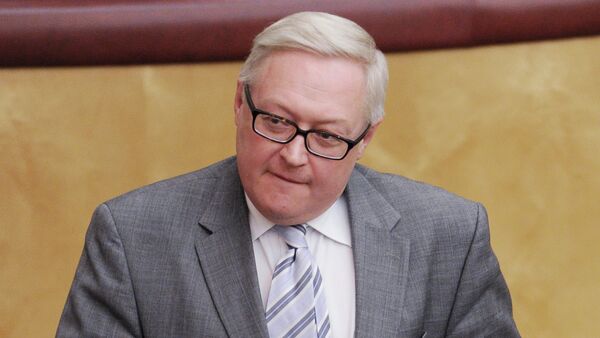MOSCOW, May 28 (RIA Novosti) – The EU’s failure on Monday to extend the arms embargo on Syria may directly harm the upcoming international conference on Syria, Russian Deputy Foreign Minister Sergei Ryabkov said on Tuesday.
“This is a reflection of double standards and a direct blow to the international conference on Syria proposed by Russian Foreign Minister Sergei Lavrov and US Secretary of State John Kerry on May 7,” Ryabkov told journalists.
EU foreign policy chief Catherine Ashton confirmed on Monday that from now on, every EU member country has the right to make its own decision on arms exports to Syria, meaning EU countries could now supply the Syrian opposition with weapons.
She affirmed that any arms sent to Syria would be "intended for the protection of civilians," and added that the European Union governments would review the position on sanctions on Syria before August 1.
Russia’s NATO envoy Alexander Grushko said he hoped the West would refrain from supplying weapons to Syria.
“We hope that there will be no such deliveries, since the most important message today is that there is no other option than a political dialogue in the given situation,” Grushko said.
Speaking about the international conference on Syria in an interview with Voice of Russia radio station earlier in the day, Ryabkov said Russia and the United States had differing views on some aspects of the planned conference, which aims to facilitate a solution to the Syrian crisis through political dialogue.
One of the issues that the United States fails to realize, he said, is that the Syrian opposition should form and send to the conference a single delegation that will represent all opposition forces in Syria.
The other issue of concern is the American reluctance to invite Iran to the conference, according to Ryabkov.
“The so-called Geneva 1 on June 30, 2012 was a success, but the next step cannot be made without Saudi Arabia, Iran and Egypt at the next conference,” he said. “Our partners unfortunately have an inflexible position in trying to prevent the Iranians from attending, which is wrong considering Tehran’s influence on the Syrian situation and in the whole region.”
This year’s conference is designed to be a follow-up to last year’s international meeting in Geneva that drafted a peace roadmap for Syria, where more than 80,000 people have died since fighting broke out between government forces and rebels in March 2011. According to diplomatic sources, the conference may take place in mid-June, but both Moscow and Washington have so far avoided giving exact dates.




